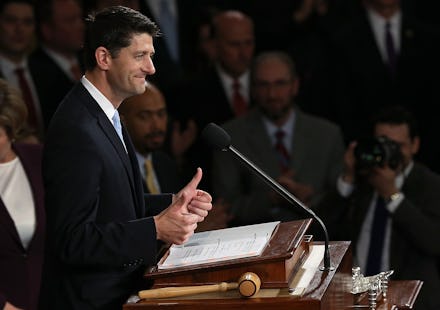Paul Ryan Is the New Speaker of the House of Representatives

It's been called the worst job in American politics.
When first floated as a replacement for outgoing House Speaker John Boehner a couple weeks ago, Rep. Paul Ryan (R-Wisc.) dismissed it out of hand. The post was seen as a professional dead end. The conservative hardliners in the Republican conference had made life miserable for Boehner, threatening to block any bargains with the White House and promising retaliation against the speaker if he defied them.
Ryan's about-face was the product of a careful campaign, orchestrated both by friends and associates who wanted him in the job and a conservative caucus that risked being sidelined completely if it didn't play ball with the establishment. After a few rounds of politicking, Ryan emerged with the support of the three most powerful groups inside his conference. The House Freedom Caucus, whose actions to depose Boehner had started the ball rolling on his departure, fell in line last week.
The internal squabbling settled, at least for now, the whole House on Thursday morning elected Ryan to the speakership with 236 votes, 18 more than the majority he needed. Only 18 Republican members defected, throwing their support behind tea party favorite Rep. Daniel Webster (R-Fla.). Even Rep. Mark Meadows (R-N.C.), the conservative who moved in late July to remove Boehner, backed Ryan on Wednesday. The remaining 184 votes went to Democratic Minority Leader Nancy Pelosi (Calif.).
With the passing of the gavel, Ryan becomes the 54th speaker of the House, pushing him to second in line to the presidency. Mitt Romney, the 2012 GOP presidential nominee who chose Ryan as his running mate, was on hand for the vote, which had been made a near-formality when Republican members nominated their respected colleague a day earlier.
In a good place: Ryan begins his reign in a significantly more comfortable position than his predecessor, thanks in large part to Boehner himself. In his final act as speaker, the Ohio congressman shepherded through a new government spending bill, which also raises the federal debt limit, that will last through the end of the Obama administration.
Without the threat of government shutdowns or the perpetually looming fiscal cliffs, Ryan and the White House are free to negotiate outside of crisis mode. While there's no guarantee this will translate into any kind of meaningful legislation or reform, the downside stakes are considerably lower. Capitol Hill's gridlock will not, at least through March 2017, threaten the broader functions of the federal government.
And that, for this Congress, is something close to a smashing success.
Correction: Oct. 29, 2015
A previous version of this story stated Rep. Paul Ryan is now third in line for the presidency. The speaker of the house is second in line.